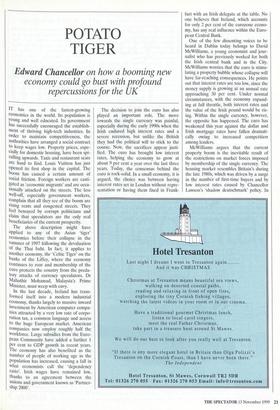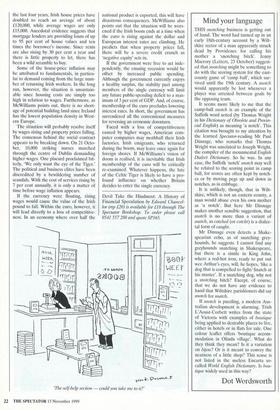POTATO TIGER
Edward Chancellor on how a booming new economy could go bust with profound repercussions for the UK
IT has one of the fastest-growing economies in the world. Its population is young and well educated. Its government has successfully encouraged the establish- ment of thriving high-tech industries. In order to maintain competitiveness, the authorities have arranged a social contract to keep wages low. Property prices, espe- cially for domestic housing, have been spi- ralling upwards. Taxis and restaurant seats are hard to find. Louis Vuitton has just opened its first shop in the capital. The boom has caused a certain amount of social friction. Foreign workers are casti- gated as 'economic migrants' and are occa- sionally attacked on the streets. The less well-off, especially government workers, complain that all they see of the boom are rising rents and congested streets. They feel betrayed by corrupt politicians and claim that speculators are the only real beneficiaries of the current prosperity. The above description might have applied to any of the Asian 'tiger' economies before their collapse in the summer of 1997 following the devaluation of the Thai baht. In fact, it applies to another economy, the 'Celtic Tiger' on the banks of the Liffey, where the economy continues to roar and membership of the euro protects the country from the preda- tory attacks of currency speculators. Dr Mahathir Mohamad, Malaysia's Prime Minister, must weep with envy. In the last decade, Ireland has trans- formed itself into a modern industrial economy, thanks largely to massive inward investment by American computer compa- nies attracted by a very low rate of corpo- ration tax, a common language and access to the huge European market. American companies now employ roughly half the workforce. Large subsidies from the Euro- pean Community have added a further 1 per cent to GDP growth in recent years. The economy has also benefited as the number of people of working age in the population has increased, causing a fall in what economists call the 'dependency ratio'. Irish wages have remained low, thanks to an agreement between the unions and government known as 'Partner- ship 2000'. The decision to join the euro has also played an important role. The move towards the single currency was painful, especially during the early 1990s when the Irish endured high interest rates and a severe recession, but unlike the British they had the political will to stick to the course. Now, the sacrifices appear justi- fied. The euro has brought low interest rates, helping the economy to grow at about 9 per cent a year over the last three years. Today, the consensus behind the euro is rock-solid. In a small economy, it is argued, the choice was between having interest rates set in London without repre- sentation or having them fixed in Frank- furt with an Irish delegate at the table. No one believes that Ireland, which accounts for only 2 per cent of the eurozone econo- my, has any real influence within the Euro- pean Central Bank.
One of the few dissenting voices to be heard in Dublin today belongs to David McWilliams, a young economist and jour- nalist who has previously worked for both the Irish central bank and in the City. McWilliams worries that the euro is stimu- lating a property bubble whose collapse will have far-reaching consequences. He points out that interest rates are too low, since the money supply is growing at an annual rate approaching 30 per cent. Under normal circumstances, with the economy expand- ing at full throttle, both interest rates and the value of the Irish pound would be ris- ing. Within the single currency, however, the opposite has happened. The euro has weakened this year against the dollar and Irish mortgage rates have fallen dramati- cally owing to increased competition among lenders.
McWilliams argues that the current property boom is the inevitable result of the restrictions on market forces imposed by membership of the single currency. The housing market resembles Britain's during the late 1980s, which was driven by a surge in the number of first-time buyers and by low interest rates caused by Chancellor Lawson's 'shadow deutschmark' policy. In the last four years, Irish house prices have doubled to reach an average of about £120,000, while average wages are only £15,000. Anecdotal evidence suggests that mortgage lenders are providing loans of up to 95 per cent of house values and ten times the borrower's income. Since rents are also rising by 30 per cent a year and there is little property to let, there has been a wild scramble to buy.
Some of the house-price inflation may be attributed to fundamentals, in particu- lar to demand coming from the large num- ber of returning Irish workers. In the long run, however, the situation is unsustain- able since housing costs are simply too high in relation to wages. Furthermore, as McWilliams points out, there is no short- age of potential building land since Ireland has the lowest population density in West- ern Europe.
The situation will probably resolve itself by wages rising and property prices falling. The consensus behind the social contract appears to be breaking down. On 21 Octo- ber, 10,000 striking nurses marched through the centre of Dublin demanding higher wages. One placard proclaimed bit- terly, 'We only want the eye of the Tiger.' The political and business elites have been discredited by a bewildering number of scandals. With the cost of services rising by 7 per cent annually, it is only a matter of time before wage inflation appears.
If the currency were floating, rising wages would cause the value of the Irish pound to fall. Within the euro, however, it will lead directly to a loss of competitive- ness. In an economy where over half the national product is exported, this will have disastrous consequences. McWilliams also points out that the situation will be wors- ened if the Irish boom ends at a time when the euro is rising against the dollar and European interest rates are climbing. He predicts that when property prices fall, there will be a severe credit crunch as 'negative equity' sets in.
If the government were free to act inde- pendently, the ensuing recession would be offset by increased public spending. Although the government currently enjoys a healthy surplus, the stability pact among members of the single currency will limit any future public-spending deficit to a max- imum of 3 per cent of GDP. And, of course, membership of the euro precludes lowering interest rates. In short, the government has surrendered all the conventional measures for reversing an economic downturn.
Faced with a loss of competitiveness caused by higher wages, American com- puter companies may mothball their Irish factories. Irish emigrants, who returned during the boom, may leave once again for foreign shores. If McWilliams's vision of doom is realised, it is inevitable that Irish membership of the euro will be critically re-examined. Whatever happens, the fate of the Celtic Tiger is likely to have a pro- found influence on whether Britain decides to enter the single currency.
Devil Take the Hindmost: A History of Financial Speculation by Edward Chancel- lor (rip £20) is available for i18 through The Spectator Bookshop. To order please call 0541 557 288 and quote SP165.
'The self-help section — could you take me to it?'



























































































 Previous page
Previous page